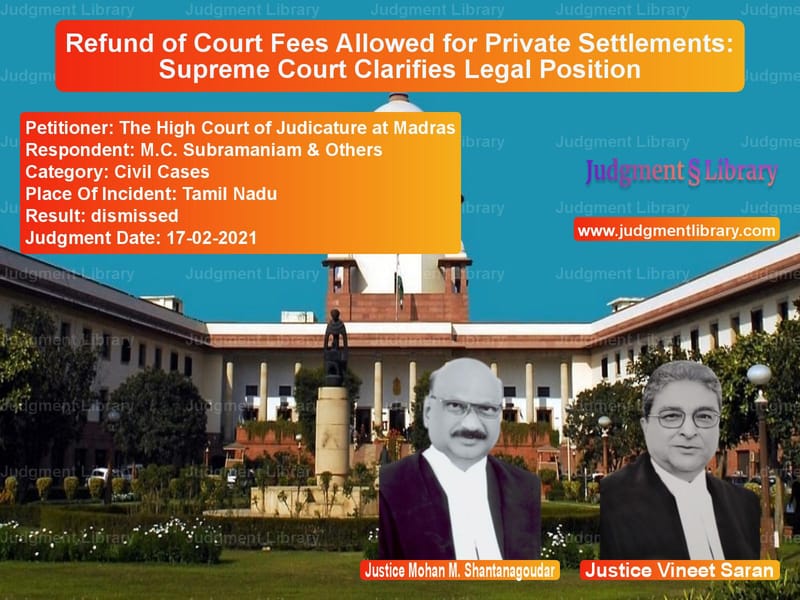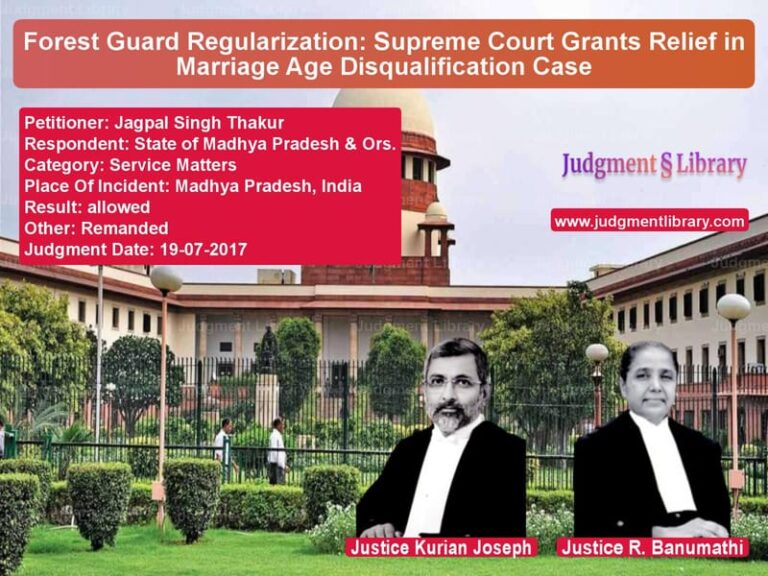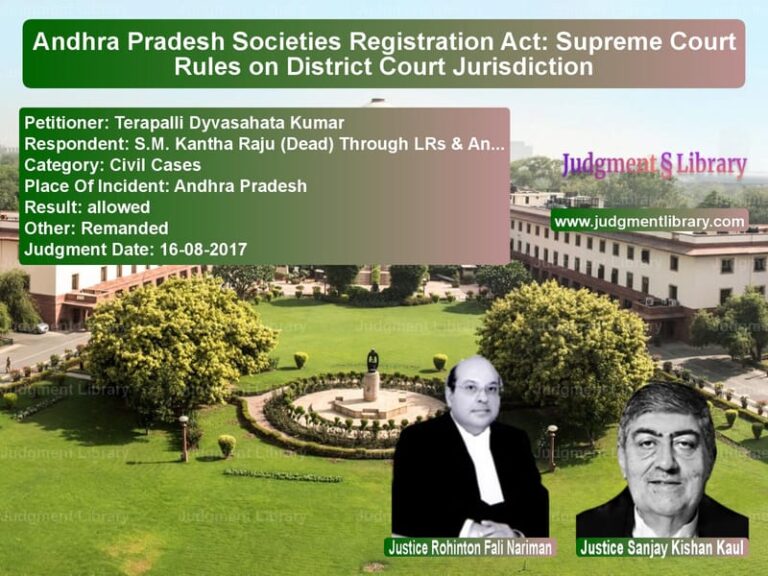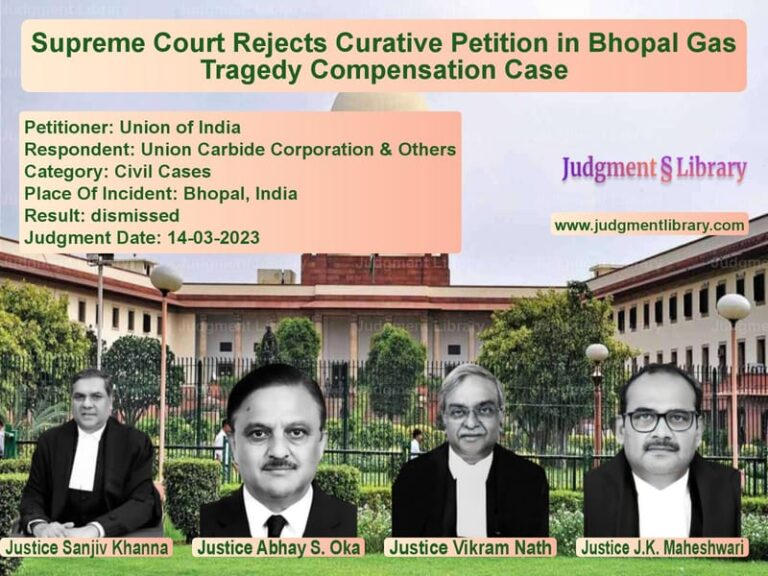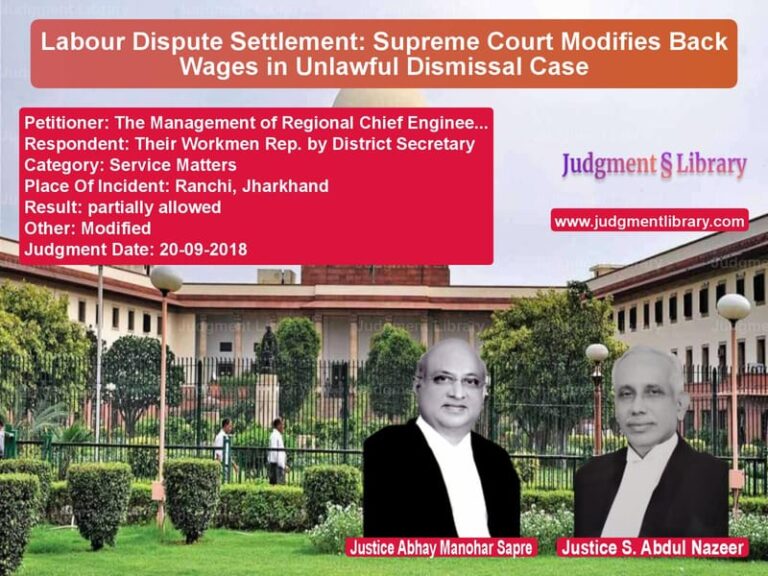Refund of Court Fees Allowed for Private Settlements: Supreme Court Clarifies Legal Position
The Supreme Court of India recently ruled in the case of The High Court of Judicature at Madras vs. M.C. Subramaniam & Others, clarifying the legal position on the refund of court fees when parties privately settle disputes. The Court upheld the Madras High Court’s decision, allowing the refund of court fees even in cases where disputes are resolved outside the purview of formal mediation or arbitration.
Background of the Case
The dispute arose from two civil appeals filed by M.C. Subramaniam, who had engaged in litigation over financial transactions. While the cases were pending before the Madras High Court, the parties involved decided to settle the matter privately without resorting to court-mandated mediation.
Following the settlement, Subramaniam withdrew his appeals and sought a refund of the court fees he had deposited. The Madras High Court granted the refund under Section 69-A of the Tamil Nadu Court Fees and Suit Valuation Act, 1955, interpreting it in conjunction with Section 89 of the Code of Civil Procedure, 1908 (CPC).
Petitioner’s (Madras High Court) Arguments
The Registrar General of the Madras High Court, representing the petitioners, challenged the decision, arguing:
- Section 69-A of the Tamil Nadu Court Fees and Suit Valuation Act only permits a refund if the dispute is referred to and settled through one of the alternative dispute resolution (ADR) mechanisms prescribed under Section 89 of the CPC (mediation, arbitration, conciliation, or Lok Adalat).
- The refund was granted incorrectly because the settlement in question was reached privately, without any court-mandated ADR process.
- Allowing such refunds could lead to administrative and financial complications for the state.
Respondent’s (M.C. Subramaniam & Others) Arguments
The respondents countered these claims, stating:
- Section 69-A should be interpreted liberally to encourage out-of-court settlements.
- Limiting court fee refunds to disputes settled only through formal ADR mechanisms would be unfair and discourage parties from resolving disputes amicably.
- The purpose of Section 69-A is to incentivize dispute resolution outside the court system, thus reducing the burden on the judiciary.
Supreme Court’s Observations
The Supreme Court, comprising Justices Mohan M. Shantanagoudar and Vineet Saran, upheld the High Court’s decision and made the following key observations:
- The purpose of Section 69-A is to promote out-of-court settlements and reduce judicial backlog.
- “A narrow interpretation of Section 69-A would lead to an unjust outcome where only cases referred by the court for mediation or arbitration would be eligible for refund, while private settlements, which also serve the same purpose, would be denied such benefit.”
- The Court emphasized that a strict interpretation of the law would discourage parties from amicably resolving disputes without judicial intervention.
- The interpretation should be in line with Article 14 of the Constitution, ensuring equal treatment for all parties opting for dispute resolution outside the courtroom.
The Court reiterated:
“The provision allowing refund of court fees should not be confined solely to cases referred under Section 89 of the CPC, as it would lead to an arbitrary classification between different modes of settlement.”
Final Judgment
The Supreme Court ruled:
- The decision of the Madras High Court was correct in granting a refund of court fees.
- Refunds should be allowed even in cases where disputes are resolved privately, without formal reference to ADR under Section 89 of the CPC.
- The Tamil Nadu Court Fees and Suit Valuation Act, 1955, should be interpreted in a manner that promotes alternative dispute resolution in all its forms.
- The state authorities were directed to refund the court fees to the respondents within six weeks.
Impact of the Judgment
This ruling has significant implications for civil litigation and dispute resolution in India:
- Encouragement of Private Settlements: The judgment clarifies that out-of-court settlements, even without court intervention, will be rewarded with a refund of court fees.
- Reduction in Judicial Backlog: By incentivizing private dispute resolution, the ruling could help reduce the number of cases pending in courts.
- Uniform Treatment for Settlements: The decision ensures that all settlement mechanisms—whether court-referred or privately negotiated—receive the same legal benefits.
- Guidance for Other States: Other states with similar court fee provisions may adopt this broad interpretation to promote faster dispute resolution.
Conclusion
The Supreme Court’s ruling in The High Court of Judicature at Madras vs. M.C. Subramaniam & Others is a landmark decision that broadens the scope of court fee refunds for settled disputes. By allowing refunds even for privately resolved cases, the Court has strengthened the framework for alternative dispute resolution in India.
This judgment serves as an important precedent, ensuring that parties who choose to settle disputes amicably are not financially penalized. It encourages a culture of negotiation and compromise, ultimately benefiting the judiciary and litigants alike.
Petitioner Name: The High Court of Judicature at Madras.Respondent Name: M.C. Subramaniam & Others.Judgment By: Justice Mohan M. Shantanagoudar, Justice Vineet Saran.Place Of Incident: Tamil Nadu.Judgment Date: 17-02-2021.
Don’t miss out on the full details! Download the complete judgment in PDF format below and gain valuable insights instantly!
Download Judgment: the-high-court-of-ju-vs-m.c.-subramaniam-&-o-supreme-court-of-india-judgment-dated-17-02-2021.pdf
Directly Download Judgment: Directly download this Judgment
See all petitions in Dispute Resolution Mechanisms
See all petitions in Contract Disputes
See all petitions in Consumer Rights
See all petitions in Judgment by Mohan M. Shantanagoudar
See all petitions in Judgment by Vineet Saran
See all petitions in dismissed
See all petitions in supreme court of India judgments February 2021
See all petitions in 2021 judgments
See all posts in Civil Cases Category
See all allowed petitions in Civil Cases Category
See all Dismissed petitions in Civil Cases Category
See all partially allowed petitions in Civil Cases Category

